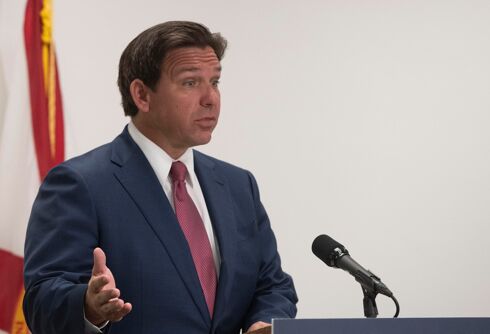In March 2022 as reported by CNN, a teacher sued her Kansas public school over a policy preventing teachers from outing transgender students to their parents after the teacher sued.
The teacher stated that the policy aimed at protecting transgender and gender-diverse youth violated her “religious freedom.”
Related: Trans equality wins in Kansas as legislature fails to override sports ban veto
Fort Riley Middle School math teacher Pamela Ricard sued USD 475 Geary County Schools over LGBTQ anti-discrimination policies that she claimed conflicted with her Christian beliefs.
Never Miss a Beat
Subscribe to our newsletter to stay ahead of the latest LGBTQ+ political news and insights.
Ricard sued and won a preliminary, temporary injunction giving her legal license to out transgender students to their parents, even if it poses a risk to the student’s safety. The injunction only applies to her and not other teachers in the district.
In the lawsuit, she argued that denying requests to allow her to ignore students’ preferred names and pronouns “deprived her of due process and equal protection of law” and violated her First Amendment rights to free speech and exercise of religion. Ricard also accused the defendants of breaching their contract with her.
According to the memorandum and order filed on behalf of Ricard, the lawsuit stems from Ricard’s “opposition to the District’s policies” that
- Required her to refer to students by preferred first name and pronouns (“Preferred Names and Pronouns Policy”)
- Prohibited her from referring to a student by the student’s preferred names and pronouns in her communications with the student’s parents unless the student requests the administration or counselor to do so (“Communication with Parents Policy”).
The Sunflower State Journal, a non-partisan, independent publication that covers events occurring in the state of Kansas, obtained a copy of the lawsuit that describes Ricard as an “exemplary” teacher with a “decades-long career in K-12 public schools.”
The lawsuit describes Ricard being suspended three days and being issued a written reprimand for deadnaming a student.
The Washington Post provided the backstory to the suspension. In spring 2021, Ricard called a student “miss” to get the student’s attention at the end of class, court records state.
After class, another classmate emailed the teacher, Pamela Ricard, to let her know that the student now used he/him pronouns and a different first name.
The next day, however, Ricard used the student’s last name, avoiding the new name or any pronouns at all. The classmate grew frustrated, leaving a note on Ricard’s desk accusing the teacher of being “transphobic.” The note ended with a remark on the classmate’s own gender identity: “my pronouns are he/they btw.”
In the lawsuit, Ricard — who is Christian — says she was uncomfortable with referring to the students by names and pronouns that were different from what was listed in the district’s enrollment system. After some disagreement with school officials on how to handle the situation, Ricard was suspended and later issued a written reprimand for her refusal to comply with the district’s policies on diversity and inclusion.
This is the scenario that led to Ricard filing her lawsuit in court District 10.
Ricard’s lawsuit was won with the help of the Alliance Defending Freedom (ADF), an international Christian organization out of Scottsdale, Arizona deemed a hate group by the Southern Poverty Law Center. Described as a “Christian legal army” by The Nation with connections to Republicans like Sen. Josh Hawley (R-MO) and Supreme Court Justice Amy Comey Barrett, ADF’s goal is to enforce strict Christian fundamentalism onto not only the U.S. but also the world.
In 2021, the ADF was found to be behind a bevy of anti-trans legislation, drafting model legislation for Republicans to use in order introduce anti-trans bills in Republican-controlled state legislatures.
District Judge Holly Teeter, appointed by Donald Trump, blocked the LGBTQ anti-discrimination policies, stating in her opinion that the “Plaintiff believes that addressing students one way at school and a different way when speaking to their parents is dishonest,” which “violates her sincere religious beliefs.”
According to the Topeka Capital-Journal, Judge Teeter also stated in her opinion that “The Court relies on Plaintiff’s statements that she does not intend to communicate with a parent for the sole purpose of disclosing a student’s preferred name and pronouns.”
This drew the ire of LGBTQ activists in the Sunflower State.
All students, including transgender and nonbinary youths, deserve to feel safe at school, said Will Rapp, a statewide organizer for the Kansas chapter of GLSEN.
Rapp said that supportive educators “are a lifeline and make all the difference” in the well-being and mental health of LGBTQ children who don’t have the same level of support at home.
“Any effort to force teachers to out students to their guardians is a violation of young people’s privacy and can place vulnerable young people in harm’s way,” Rapp said. “When transgender and nonbinary youth feel unsafe at school, they experience negative impacts not only to their health, but to their academic achievement and likelihood of graduating or moving to higher education opportunities. Attempts to forcibly out students also jeopardize educators’ ability to foster trust and create the kind of safe school environment that allows young people to grow and learn without fear of harassment or discrimination.”
A 2019 study published in the Journal of School Psychology found that the number of policies dedicated to LGBTQ inclusion was associated with less victimization and bullying for LGBTQ youth, alongside with higher grades for transgender youth. Additionally, a greater number of LGBTQ-inclusive policies was associated with lower truancy for all students. A report from the Trevor Project shows that just one accepting adult can reduce the risk of a suicide attempt by 40 percent.
It is clear that when schools provide safe and inclusive environments for LGBTQ students, LGBTQ students thrive. The evidence shows that hostile and unwelcoming environments for LGBTQ students can not only be described as detrimental but also possibly life-threatening.














